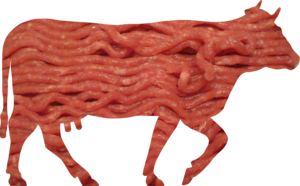We are constantly bombarded with the idea that fossil fuels are the number one cause of human induced climate change on the planet. Numerous organizations (Greenpeace for example) constantly fail to address the real number one cause of human induced climate change and environmental degradation, which is animal meat consumption by humans. Obviously, other human activities are also detrimental to our planet, but this one continues to remain unacknowledged and ignored.
In late November 2006, the U.N Food and Agriculture Organization issued a report stating that the livestock business generates more greenhouse gas emissions than all forms of transportation combined, and it’s true.(1)(2)(3)(4)
If greenhouse gases are contributing to climate change, it’s staggering to realize 51 percent or more of global greenhouse-gas emissions are caused by animal agriculture, according to the Worldwatch Institute. (5)
Changing Diet As A Solution
Researchers at the University of Chicago concluded that switching from a standard American diet to a vegan diet is more effective in the fight against climate change than switching from a standard American car to a hybrid.(6)
A German study conducted in 2008 concluded that a meat-eater’s diet is responsible for more than seven times as much greenhouse-gas emissions as a vegan’s diet is. (2)
Scientists at Chalmers University of Technology in Sweden confirmed that reducing greenhouse-gas emissions from energy and transportation use alone would not be enough to change the direction of climate change. The lead scientist, Dr. Fredrik Hedenus, said that “reducing meat and dairy consumption is key to bringing agricultural climate pollution down to safe levels.”(6)(7)
Ilmi Granoff from the Overseas Development Institute has demanded officials to “forget coal, forget cars, the fastest way to address climate change would be to dramatically reduce the amount of meat people eat.” The Swedish researchers estimate that by 2050, beef and lamb production will account for half of all agricultural greenhouse-gas emissions. They expect that cheese and other dairy products will cause a quarter of agricultural climate pollution in the next 40 years. (source)
According to the Huffington Post:
“The billions of chickens, turkeys, pigs and cows who are raised for food each year in the U.S. produce a tremendous amount of excrement, releasing methane and other greenhouse gases into our atmosphere. Methane, which is at least 20 times more potent than carbon dioxide, accounts for 9 percent of the greenhouse-gas emissions in this country. And the 523 million chickens raised and killed each year in Delaware and Maryland alone generate enough waste to fill the dome of the U.S. Capitol about 50 times in a single year–or almost once a week. And each cow emits approximately 66 to 79 gallons of methane every single day. There are currently 88 million cattle in the United States. You do the math. Together, these cows reportedly produce more methane than landfills, natural gas leaks and fracking.” (source)
Modern Day Meat Consumption Is Far From What It Used To Be
Modern day meat consumption is far from what it used to be. Today, billions of animals are forcefully bred and tortured due to the fact that many of us consume meat on a daily basis, all day, everyday. Think about that for a moment.
Below are a few clips from the upcoming documentary called “Cowspiracy.” It’s going to be available on November 6th, and sheds light on the modern day meat industry and its relation to climate change as well as its detrimental effect on Earth’s environment, in multiple ways. It goes deeper, and provides more information on the fact that modern day meat consumption is the leading cause of environmental destruction and human induced climate change on our planet, yet we never hear about it.
What is really destroying the Rainforest?
Eating one hamburger is the equivalent of showering two entire months. One quarter point hamburger requires over 660 gallons of water to produce it.
Ocean pollution
Some more staggering statistics
Sources:
(2) http://www.peta.org/issues/animals-used-for-food/meat-environment/
(3) http://www.fao.org/newsroom/en/News/2006/1000448/index.html
(4) http://www.un.org/apps/news/story.asp?newsID=20772#.VB3qofldU0R
(5) http://www.worldwatch.org/files/pdf/Livestock%20and%20Climate%20Change.pdf
(7) http://www.huffingtonpost.com/tracy-reiman/electric-cars-arent-enoug_b_5187669.html







